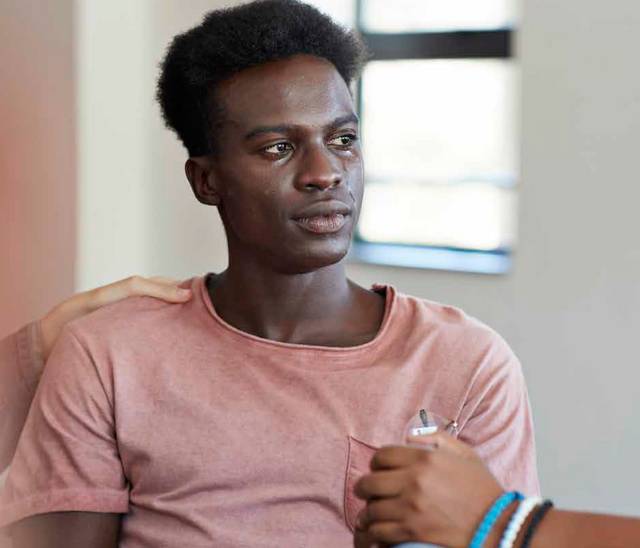
Alumni on the Move
A call for creative healing
Access to adequate, appropriate mental healthcare in Africa is a challenge. Drama therapy offers a creative and curious alternative approach to healing. Jessica Mayson (South Africa & WITS, 2018) introduces the growing discipline and its strengths.
There are many reasons for the mental healthcare crisis. There is extensive trauma, anxiety, depression and overwhelming grief among South Africans. The dangerously addictive relief that substances bring is also widespread. There is limited accessibility to care, as there is an exceedingly vast and varied need and few mental healthcare professionals. Many South Africans are reluctant to seek mental healthcare because of the stigma and shame related to mental health.
South Africa’s diversity introduces another layer of complexity. Traditional, Western forms of therapy do not always fit with the diverse cultural approaches to healing that exist. Talk-based, problem-focused individual therapy contrasts with the ritual, communal, and body- and health-based approaches to healing that are familiar to many South Africans. Power dynamics, marginalisation and unconscious assumptions about others can also enter the therapy space. If not addressed, therapy can further entrench these dynamics. These challenges, among many others, contribute to the crisis.
It is clearly urgent to focus on alternative approaches within mental healthcare. These need to be flexible, creative and self-reflective in order to thrive and embrace the realities of the South African context.
Healing through storytelling and theatre in context
For thousands of years, across diverse settings and through turbulent historical events, drama-based methods have been used to promote healing and wellbeing. It is important to remember the traditional and ancient ways in which dramatic elements have been used for healing in South African daily life. This can be seen in practices such as iintsomi, which is traditional folktale-style oral storytelling often held in community by elders, and in rites of passage and transition ceremonies that use dramatic elements of story, performance and ritual.
Drama-based methods are also seen in South Africa’s history of protest theatre. The play Woza Albert, first performed in the 1980s, explored the second coming of Christ taking place in apartheid South Africa. The play allowed audiences to process their complex feelings of both hope and abandonment during the violence and despair of the period. The South African Truth and Reconciliation Commission (TRC) was a national attempt to acknowledge and forgive the atrocities of the apartheid regime in the mid-1990s. The TRC also used drama-based methods of healing. It invited painful stories to be told and witnessed by those involved in them. Here, the dramatic elements of being a witness and storyteller were used with the intention of building empathy and allowing for emotional release.
How drama therapy works
Drama therapy is based on these and other drama-based methods. It is a form of psychological therapy in which all of the performance arts are used. In drama therapy, the drama process itself is valued as the therapy: it is not merely drama techniques added to other forms of therapy. Drama therapists are both artists and clinicians, and work with individuals and groups using storytelling, improvisation, role play, performance, ritual, dramatic play, puppetry and myths to bring about psychological, emotional and social change. Drama therapists work in community-based settings, psychiatric settings, correctional services, care homes, rehabilitation centres, schools, corporate settings and in private practice. Training in South Africa began at Drama for Life, at the University of the Witwatersrand, in 2014. It is the only accredited drama therapy training programme in Africa, and it seeks to actively ground drama therapy in indigenous knowledge systems, critical self-reflection and social justice.
Drama therapy is emerging as an approach with immense capacity for curiosity, flexibility and creativity. This allows it to take shape firmly and effectively in and amongst the challenges of mental healthcare in South Africa. This is crucial, as these challenges are not going to disappear. Appropriate, effective and accessible ways of providing care need to be found within the crisis.
The five distinct strengths of drama therapy
During my Masters in drama therapy, I conducted research and identified five distinctive strengths that give it its power in South Africa. Using an online questionnaire, I was able to gain information from 67.8% of the drama therapists currently practising in South Africa – a trusty reflection of the current reality. I believe that these strengths have relevance and can live and thrive in other diverse African countries.
-
Drama therapy is creative and generative
The creativity, spontaneity and flexibility of drama are active and generative even within contexts of crisis and destruction. New worlds can be explored and multiple perspectives can be played with, within the imaginary world of drama. This builds up reserves of resilience within participants. The same is so for drama therapists, who are resilient, adaptable and generative in their practice. They remain dedicated to providing the best care in socially just, creative ways, in spite of restrictions, challenges, and a lack of awareness and systemic support. Drama therapists are able to ensure that quality and resiliency-building mental healthcare is available for those in need.
-
Drama therapy uses familiar methods
Drama therapy focuses on and successfully uses ancient drama methods that are familiar to people across cultures and locations. Drama therapy can work for clients regardless of their background. Story and play are two of these methods particularly used in South Africa. Story uses myths, folklore and improvised stories to work therapeutically. The characters, themes and settings of the stories mirror clients’ own worlds and allow them to explore these worlds and gain new perspective and insight. Play uses the childhood spark of creativity and spontaneity, innate in everyone, to build the ability to experiment with new ways of being in real life. This is done through improvisation, role play, play with puppets or other objects, or drama games. Play also allows clients the freedom to physically and artistically express and explore their internal debates, struggles or themes that are present in their lives. Story and play enable the client to explore pain or trauma through symbols, metaphor or characters, which helps them work through difficulty from a safer distance. By focusing on the elements of drama that are familiar across cultures, drama therapy can be easily welcomed as a therapy by diverse South Africans.
-
Drama therapy uses local knowledge of healing
Drama therapy is able to incorporate South African knowledge of healing into its ambit. It brings in ecological and communal approaches to healing by often using group work, and it incorporates aspects of indigenous ritual practices. The use of existing knowledge is advocated by Sinethemba Makanya, a South African drama therapist. Writing in a 2014 article in The Arts in Psychotherapy, she suggests that she and her colleagues “find a way of using knowledge that South Africans already possess in order for them to have ownership in their own development and healing. The aim is to use methods they already recognise as their own and mobilise their own forces for their own gain.” This capacity can also help dismantle the power and privilege within the therapy room that contributes to the complexity of the crisis of mental healthcare in South Africa.
-
Drama therapy focuses on social justice
Drama therapists in South Africa often play the devil’s advocate within the mental healthcare system, trying to provoke open conversations about the norms and assumptions around therapy in postcolonial and diverse settings. This strength and commitment to social justice is increased by ongoing self-reflection that forces drama therapists to engage with their own biases and privileges. Self-reflection is a responsibility of drama therapists across postcolonial contexts, in order to bring about socially just mental healthcare. Drama therapy in South Africa is also guided strongly by humanism. It focuses on the human beings who meet in the therapy room, rather than the inflexible power dynamics between therapist and client. This stimulates connection and shared humanity, which in itself allows the collective trauma in South Africa, a result of decades of social injustice, to be worked through. These orientations allow the discipline to remain healthy and relevant within the mental healthcare system by critiquing entrenched norms and power inequalities.
-
Drama therapists work with varied needs
Drama therapists in South Africa have shown themselves as capable of, and accomplished in, working with multiple client populations. On average, drama therapists in this country work with 5-6 different client groups and 12-13 different mental health needs in their current practice at once. This positions them as reliable and effective professionals who are able to meet the varied mental health needs in South Africa.
Drama therapy is slowly emerging as a leader in how to best serve the needs of the many who are desperately seeking meaningful and quality mental healthcare in South Africa. This leadership can inspire other mental healthcare disciplines and professionals to mandate that their own approach becomes increasingly inclusive and creative. This experience also suggests that when working in crisis, no matter what our profession or geography, there is guidance and hope to be found in the cultures and ancient practices of the people living within the crisis itself. This reminder, along with the power of flexible creativity, can ground the integrity of any newly emerging system.







